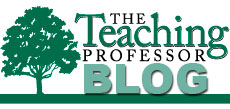Part-time faculty make essential contributions to our programs. Their part-time status often limits their contact with other faculty and their knowledge about the program in which they are teaching. Program coordinators and directors often provide the only contact between the two, and so play a critical but challenging leadership role. However, coordinators may also tend to work in isolation from one another and may lack opportunities to share experiences and learn from one another.
Read more ›CURRENT ARTICLE • October 19
OTHER RECENT ARTICLES
Beginning college teachers benefit when they have an instructional mentor. That fact is well established; as is the fact that mentoring benefits those who mentor. The influx of new faculty over the past few years has caused mentoring programs to flourish. All kinds of activities have been proposed so that mentors and mentees can spend their time together profitably. Addressed less often are those instructional topics particularly beneficial for the experienced and less-experienced teachers to address. Here's a list of possibilities.
Read More ›The quest to get students doing assigned reading and engaging with that material is one of those ongoing challenges faced by university and college teachers today. Simply assigning the reading, telling students to do it and making threats about what will happen if they don’t is rarely enough to get most of today’s students interacting with their texts. It almost always takes something more, and if you regularly read this blog you know that we’re always looking for good ideas—especially those that not only get students doing the reading but those that help to develop their reading skills in the process. And, I’ve found another promising approach. I’ll be highlighting this strategy in much greater detail in an upcoming issue of the newsletter, but here’s a preview.
Read More ›“Our course restructuring was motivated by several perceived deficiencies common to traditional lecture-based introductory courses. The most pronounced concern, shared by multiple faculty involved in the course, was poor student attitudes. Both numeric and written responses on course evaluations indicated that students were not satisfied with the course and did not recognize the importance of the course content to their education as biologists. For example, students often commented on course evaluations that the lectures and/or course materials were ‘boring.’ Furthermore, individual instructor-student interactions often indicated that students were more concerned with their test scores than with gaining a thorough understanding of the course material. Poor student attitudes also were reflected by poor attendance, limited participation in class, and suboptimal student performance.” (p. 204)
Read More ›When you’re a new college teacher, good advice can be so helpful. Studies are important—good practice rests on what has been verified about teaching and learning, but early on, it’s those practical bits of wisdom that help a beginner get a handle on the details that matter most. The other thing about advice for new teachers is that it contains important reminders to those who’ve been teaching for a while. I’ve found an example that illustrates. Edward Burmila suggests “Seven Things to Know about Teaching Your Own Course while in Graduate School.” Here they are with a sampling of the pithy quotes that appear throughout his article.
Read More ›Magna Publications, the leading provider of professional development resources for the higher education community, today issued a Call for Proposals for the 2011 Teaching Professor Conference to be held May 20-22 in Atlanta.
Read More ›I was traveling again last week and dining by myself in a local restaurant. I had forgotten to bring something to read, but the restaurant, named the The Library, had stacks of old books decorating the short walls between different sections of the dining room. In the stack near my table I found Teacher Education in Transition, published in 1969. The book smelled as old as it looked.
Read More › “Feedback by nature must be negative to an extent if it is to be helpful in improving performance. Much of the feedback that instructors give on assignments is to specifically point out the shortcomings of a student’s work and motivate the student toward improvement. Such feedback is intended to be received as ‘constructive criticism.’ However, although students may say they value feedback in general, when it is about their own performance and by extension themselves, the impact on self-esteem may provoke a negative reaction.” (p. 174)
“Feedback by nature must be negative to an extent if it is to be helpful in improving performance. Much of the feedback that instructors give on assignments is to specifically point out the shortcomings of a student’s work and motivate the student toward improvement. Such feedback is intended to be received as ‘constructive criticism.’ However, although students may say they value feedback in general, when it is about their own performance and by extension themselves, the impact on self-esteem may provoke a negative reaction.” (p. 174)
“One telling measure of how differently teaching is regarded from traditional scholarship or research within the academy is what a difference it makes to have a ‘problem’ in one versus the other. In scholarship and research, having a ‘problem’ is at the heart of the investigative process; it is the compound of the generative questions around which all creative and productive activity revolves. But in one’s teaching, a ‘problem’ is something you don’t want to have, and if you have one, you probably want to fix it. Asking a colleague about a problem in his or her research is an invitation; asking about a problem in one’s teaching would probably seem like an accusation. Changing the status of the problem in teaching from terminal remediation to ongoing investigation is precisely what the movement for a scholarship of teaching is all about.”
Read More ›Principle: To become self-directed learners, students must learn to assess the demands of the task, evaluate their own knowledge and skills, plan their approach, monitor their progress, and adjust their strategies as needed.
Read More ›




